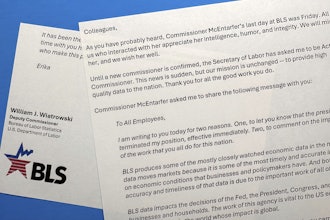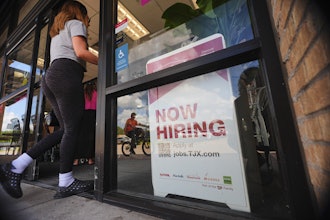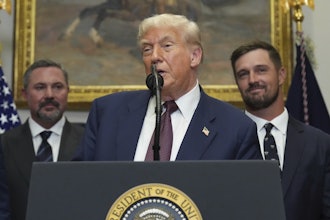The Oregonian on why voters should vote no on Measure 75, which would allow for a private casino:
Oct. 9
When times are tough, almost anything that promises jobs, new money for schools, or even just more fun and excitement is as tempting as a shiny brass ring.
Measure 75 is a glittering object on the Nov. 2 ballot.
The measure asks Oregonians to allow one of the nation's largest private casino and entertainment complexes at the old Multnomah Kennel Club dog track in Wood Village. Lake Oswego businessman Bruce Studer and lawyer Matt Rossman have spent years fine-tuning an audacious plan for the state's first private casino.
Studer, Rossman and the Canadian investment firm bankrolling the first $250 million of what could be a $450 million project are thinking big. Measure 75 would permit up to 3,500 slot machines, more than any of the mega-casinos in Las Vegas or Atlantic City. The developers are promising to pack entertainment around the sprawling gambling floors — a hotel, shopping, performing arts center, bowling alley, movie house, even a water park.
This bold proposal ought to appear on the ballot in red neon and with the standard warning on gaming: Not meant for investment purposes. More than any other question on the ballot, the Wood Village casino will measure the economic desperation of Oregonians.
Are we so desperate that we would lunge for the promise of thousands of jobs even though a state analysis concluded the casino would take most of its permanent jobs from tribal casinos, restaurants and bars, and every year send tens of millions more dollars out of the state than it would bring in?
Are we so desperate for public revenues that we are prepared to ignore projections that the Wood Village casino would draw so much gaming activity from the Oregon Lottery that it could leave the state and its schools with less money, not more?
And, finally, are we so desperate that we would buy the dubious legal argument that voters can approve a statute allowing a private casino even though language in the state constitution clearly prohibits private casinos in Oregon?
We hope not. Measure 75 is not a solution to Oregon's economic problems or its public funding crisis. It is an attempted end run around the constitutional prohibition against private casinos and a bid to grab a vast share of the gambling market in Oregon.
Oregon has nine tribal casinos and Oregon Lottery slot machines in almost every corner bar and tavern in the state. Tribal casinos are the primary — in some cases, the only — economic enterprises supporting tribal governments in Oregon. Even now, unemployment on the Warm Springs reservation is running at 60 percent. Meanwhile, two-thirds of Oregon Lottery revenue is plowed back into schools, parks and salmon, and economic development.
Yes, building a mega-casino complex would create hundreds of short-term construction jobs. But over time it's hard to see how allowing a massive private casino in Portland — and all but inviting other entrepreneurs to bring the same to Salem, Eugene or Bend — would be good for this state. It would badly hurt tribal casinos, not only reducing tribes' essential revenues but also costing jobs in rural Oregon, where they are especially hard to come by. It would badly dent the Oregon Lottery in the lucrative Portland market.
Studer and Rossman argue that their development would be so unique and appealing that it would draw out-of-state visitors and their money to Oregon. But, again, the state analysis concludes the casino could create a net loss in jobs and wouldn't add to tax revenues. Said Mazen Malik, a senior economist with the nonpartisan Legislative Revenue Office, "There is no new magic money here."
There is only a bright shiny object. Vote no on Measure 75.
Bend Bulletin on why former Secretary of State Bill Bradbury should disclose his finances:
Oct. 11
Apparently, former Secretary of State Bill Bradbury has come to consider himself the conscience of Oregon's political establishment — kind of like our very own Jimmy Carter.
He likes to discuss the "moral obligation" imposed by global warming, which he's met, he boasts, by serving on the state Sustainability Board and Global Warming Advisory Commission. He also likes to point out that he "was one of the first 50 people to be trained by Al Gore to give the 'An Inconvenient Truth' slide show."
By and large, Bradbury's moralizing involves environmental matters, from salmon preservation to fossil fuel elimination. But last week, he branched out and took up a new cause: Chris Dudley's taxes.
According to Willamette Week, the Republican candidate for governor took a $350,000 tax deduction for allowing Lake Oswego firefighters to torch a house he owned back in 2004. He later built a much larger house on the same lot, where he and his family now live. The IRS has since cracked down on the use of such deductions, but no one has argued that Dudley broke the law. Nonetheless, a spokeswoman for John Kitzhaber's campaign claimed last week that the deduction calls Dudley's values into question and argues for greater scrutiny.
And who's better qualified to lecture Oregonians about values than Bradbury? Apparently, nobody, which is why the Democratic Party of Oregon announced a press conference at which Bradbury would demand that Dudley "come clean about his tax evasions by publicly releasing his federal and State tax returns." No word on whether the returns were to have been released in a format — electronic, paper, organic papyrus — generating the smallest possible carbon footprint.
But, alas, the Democratic Party canceled the event it had announced so breathlessly. Spokeswoman Amy Wojcicki attributes the about-face to a scheduling conflict and says the party's working on a new date. We certainly hope so. Though such events are little more than political theater, Bradbury and company have a point: Candidates for important public offices ought to be more open about their finances and other matters than the law requires. For that reason, we're waiting for Bradbury and company to demand the following:
The full release of John Kitzhaber's state and federal tax returns. Back in 1999, Kitzhaber and his then-wife bought a house using an unusual loan provided by Bidwell & Co., a Portland stock brokerage. Less than three years later, Kitzhaber appointed company founder Jerry Bidwell to a prestigious, though unpaid, position on the Oregon Investment Council, which invests billions of dollars in public funds. Kitzhaber eventually released a number of tax documents related to that loan. But if one or two questionable incidents justifies a wholesale release of tax documents in Dudley's case, shouldn't the same standard apply to Kitzhaber?
The release of information about possible contracting irregularities involving the state Department of Energy and a company owned by Kitzhaber's girlfriend, Cylvia Hayes. The Oregon Department of Justice has begun an investigation into the matter, and Hayes has said that she isn't the target. That may well be true. But with a crucial election just weeks away, you'd think Bradbury would consider calling on Attorney General John Kroger to release more information. If a 6-year-old tax deduction is worth a press conference, then surely an ongoing investigation into questionable contracting involving public funds is worth a few words.
Fortunately, Bradbury doesn't need anybody's permission to release his own financial information, and he should do so if only for the sake of consistency. Gov. Ted Kulongoski recently nominated Bradbury to serve on the Northwest Power and Conservation Council, a sinecure that comes with an annual salary of $107,124 — and PERS benefits. Bradbury is a Tier 1 PERS member who retired following his second term as secretary of state. If confirmed by the Oregon Senate, though, he intends to unretire for PERS purposes.
Payments to PERS retirees are based on a number of factors, including, Bradbury acknowledges, the three highest salary years of a beneficiary's covered employment. The power council salary represents a pay hike of nearly 50 percent over the salary Bradbury earned as secretary of state. So, in the interest of consistency and full disclosure, Bradbury ought to tell taxpayers exactly how much his PERS benefits are under the terms of his current retirement and how much they could change after a few years on the power council. The potential difference might be small, but, then again, it might not.
The Register-Guard on why state lawmaker Phil Barnhart should be elected to help with the state's budget:
Oct. 8
Voters in House District 11 have a stark choice in the Nov. 2 election, and in some ways it's not an easy one.
The Democratic incumbent, Phil Barnhart, is a consummate insider, well-schooled in the intricacies of public finance. The Republican challenger, Kelly Lovelace, is a political novice who would bring a wealth of worldly experience to Salem. Both are appealing personalities, but it is Barnhart who can play the most productive role in helping Oregon weather the budgetary storms to come.
Barnhart, 64, is a lawyer and psychologist seeking his sixth term in District 11, which takes in parts of south Eugene and curves like a scimitar to cover Pleasant Hill, Coburg, Marcola and southern Linn County. Barnhart freely describes himself as a "south Eugene boy," born and raised, but says he has found great satisfaction in addressing the concerns of people and communities in rural parts of the district.
Barnhart is chairman of the House Revenue Committee, which is one of the most powerful in either legislative chamber because bills to raise taxes must originate there. Barnhart's overarching goal is to increase the fairness of the state tax system, not just in pursuit of equity but as a means of strengthening public trust in state government.
Among Barnhart's achievements is legislation requiring the periodic review of all state tax credits and exemptions. These wrinkles in the tax code are added for good public purposes — to encourage jobcreating investments, for instance, or to promote environmental stewardship — but in the aggregate, they reduce state revenues by half. The credits should be examined to ensure that they are achieving their goals. Eliminating credits that are no longer needed produces revenue for other uses, or for tax reductions.
Lovelace, 61, says that Oregon government spends too much and doesn't get its money's worth, while burdening citizens and businesses with excessive regulations and fees. He has spent a lifetime farming, ranching and running a heavy equipment manufacturing business. Lovelace knows what it takes to bring in a crop or meet a payroll — and he argues that this experience would be more useful in Salem than Barnhart's years of immersion in tax policy. If the state hopes to create jobs in natural resources and manufacturing, Lovelace says, it needs lawmakers who have managed farms and factories.
It's a compelling argument. Yet it's not as though Barnhart has spent his life sealed in a bubble. Barnhart, too, has a varied occupational background and has drawn valuable lessons from it. And unlike Barnhart, whose resume extends beyond the House to include service on the Eugene School Board, Lovelace has no previous record in elective or appointive office. Experience matters; for the District 11 job, Barnhart has it, Lovelace does not.
Barnhart is among the House's most knowledgeable and effective members, and his skills will be much in demand in the challenging period ahead. Voters in District 11 should give him another term.


















